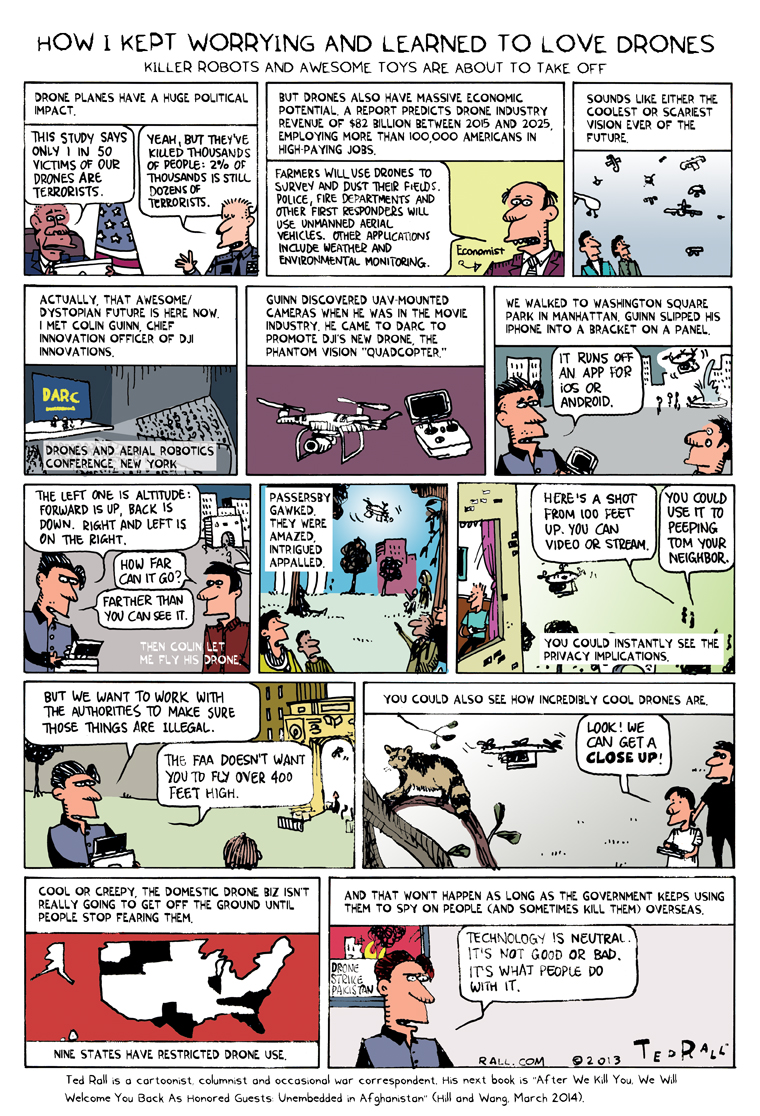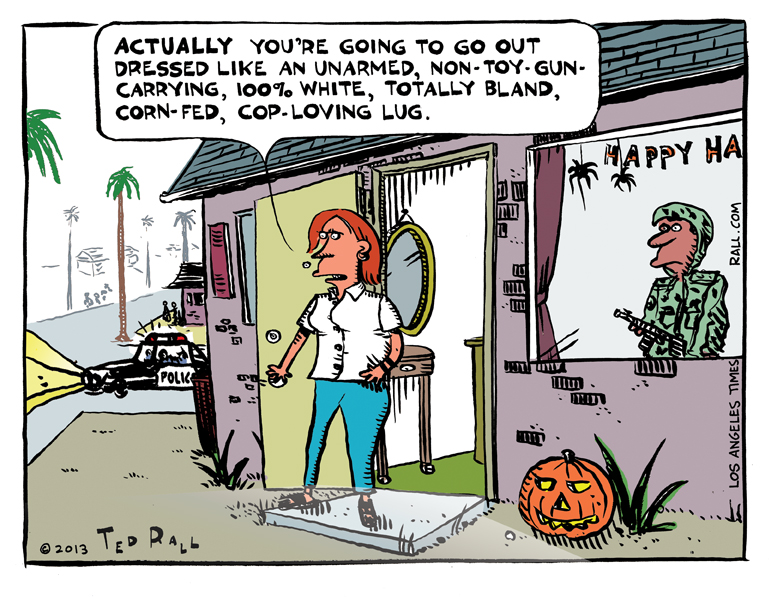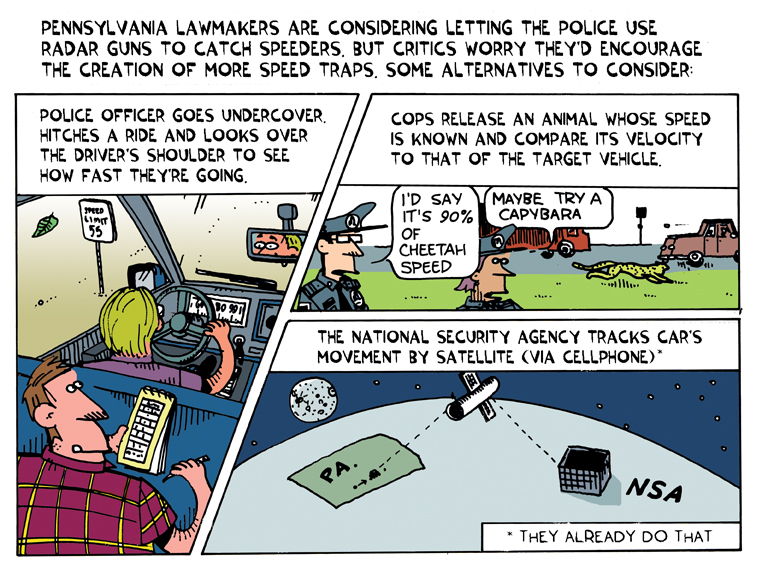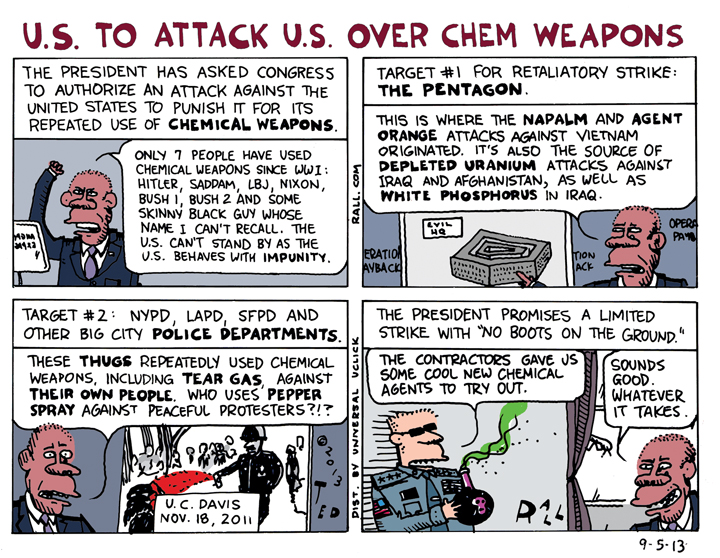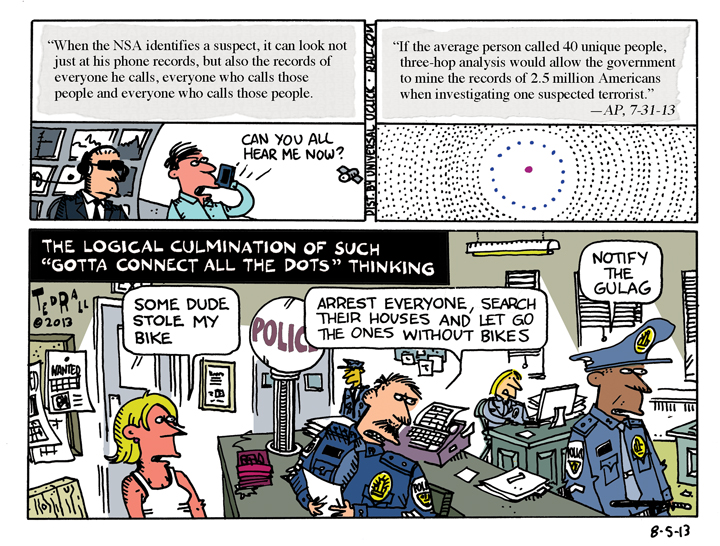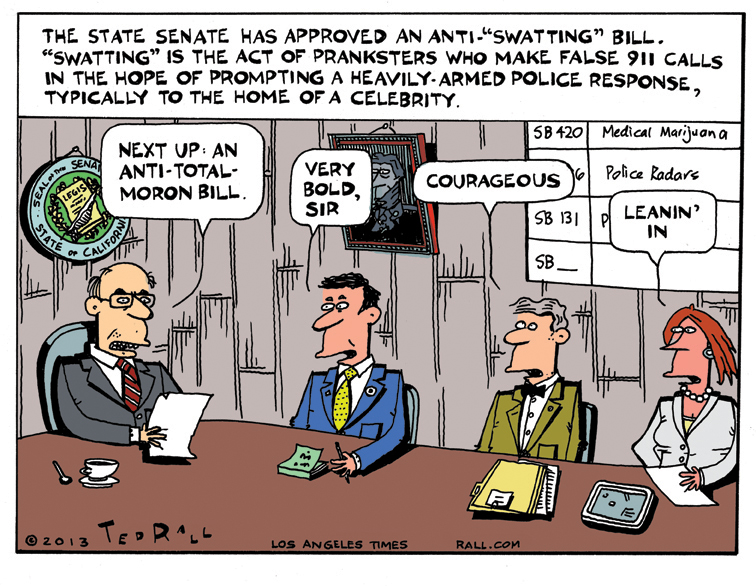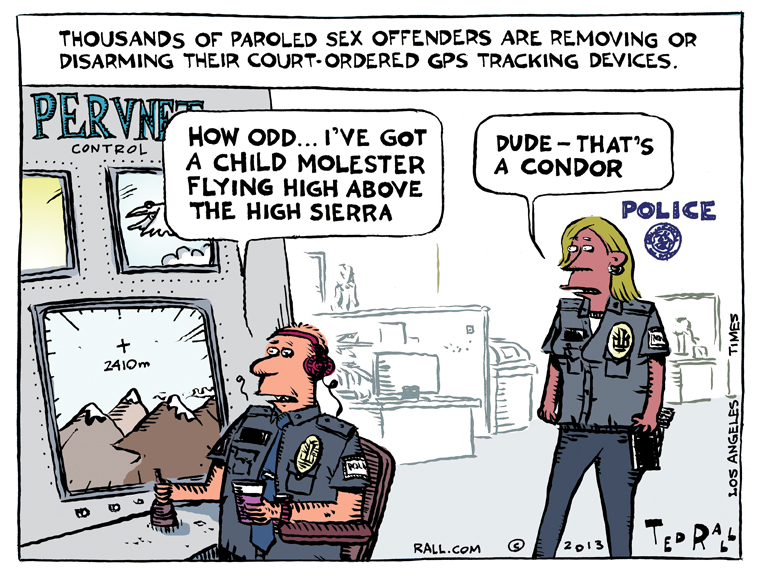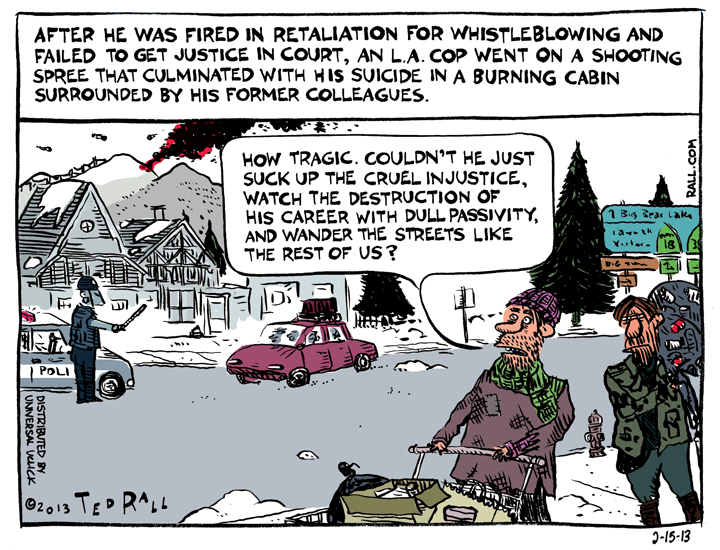I attended the Drone and Aerial Robotics Conference at New York University. I was terrified of drones…then I got to fly one myself. This is a long-form cartoon I drew for The Los Angeles Times op/ed page.
LOS ANGELES TIMES CARTOON: Santa Rosa Halloween
I draw cartoons for The Los Angeles Times about issues related to California and the Southland (metro Los Angeles).
This week: Residents of Santa Rosa, California expressed skepticism Thursday about a sheriff’s deputy’s decision to shoot dead a popular 13-year-old boy who was carrying a pellet gun that looked like an assault rifle.
LOS ANGELES TIMES CARTOON: Anti-Swatting Bill
I draw cartoons for The Los Angeles Times about issues related to California and the Southland (metro Los Angeles).
This week: The State Senate has approved an anti-“swatting” bill. “Swatting” is the act of pranksters who make false 911 calls in the hope of prompting a heavily-armed police response, typically to the home of a celebrity.
LOS ANGELES TIMES CARTOON: Perverts Flying High
I draw cartoons for The Los Angeles Times about issues related to California and the Southland (metro Los Angeles).
This week: Thousands of paroled sex offenders are removing or disarming their court-ordered GPS tracking devices.
A Tragic Alternative
After a LAPD officer reported a partner for kicking a homeless man, he was fired for filing a false report. Then Officer Christopher Dorner went on a rampage, shooting four people before being forced to commit suicide in a burning cabin. A tragic end, but what’s the alternative for people ground down by an unfair system?
SYNDICATED COLUMN: To Live and Die in L.A.
An Armed, Disposable and Dangerous System
What’s shocking is that it doesn’t happen more often.
When a heartless system refuses to listen or help, when it crushes and grinds down millions of people day after day, year after year, everywhere, it’s illogical and unreasonable to assume that all its victims will pick themselves up, dust themselves off and reinvent themselves. (Job retraining! Start a business! Win the Lotto!) Some people will crack. Others will explode.
It’s inevitable.
Consider the case of the ex-Los Angeles police officer and Iraq War vet who triggered a massive manhunt after he allegedly shot three people in retaliation for his dismissal in 2008. Based on media accounts so far, Christopher Dorner had reason to be angry. After he reported a partner for assaulting a homeless man, a review board concluded that there wasn’t enough evidence to charge the other cop. Fair enough. Maybe the partner was innocent. But then they went too far, firing the officer who brought the charge for filing a false report.
Officer Dorner had already taken a chance by stepping forward, risking ostracism and the chance to advance in his career. Firing him – even if he was wrong in this case – is heinous.
Anyone familiar with the behavior of white cops in predominantly African-American neighborhoods and who has seen the LAPD in action has to admit that the accusation – kicking a bum – is well within the realm of plausibility. Anyone who has ever faced off against an arresting officer in court knows that cops lie. And anyone who has filed a complaint against the police and their behavior soon learns that the chances of obtaining redress, much less justice, range from slim to none. (Disclosure: I’ve experienced all three.)
Ruling against Dorner in 2010, a Superior Court judge noted that administrative review panels – in this case, the LAPD itself – enjoy a “presumption of correctness” under state law. Which makes suing pointless.
“I have exhausted all available means at obtaining my name back,” Dorner wrote on Facebook. “I have attempted all legal court efforts within appeals at the Superior Courts and California Appellate courts. This is my last resort. The LAPD has suppressed the truth and it has now lead to deadly consequences.”
Los Angeles police officials spun the wanted ex-cop’s Facebook manifesto, which described the force as brutal, corrupt and racist – “The department has not changed since the Rampart and Rodney King days. It has gotten worse” – as out of date, a relic of the 1990s, before the scandal-ridden “old LAPD” got reformed (by good people like them). Unfortunately for their we’re-nice-guys-now messaging, their trigger-happy ground troops were rocking it old-school in their hunt for their former colleague, twice opening fire with assault rifles on vehicles they thought fit the description of the truck driven by the suspect before bothering to take a look at three people inside two cars, none of whom look anything like him yet wound up in the hospital anyway.
To his credit, or at least that of the Police Department’s publicity office, Chief Charlie Beck announced that the LAPD would re-examine Dorner’s dismissal.
How exactly is this going to work? If it turns out the guy was right, and that he never should’ve been let go, does he get his job back while he’s serving three life terms? Confusing. But it sounds good. That’s what matters.
Needless to say, a shooting spree is an inappropriate response to injustice. Still, the case of the cop gone rogue is a parable for our time. Authority is unaccountable. Individuals are powerless. Checks and balances, however well they worked in the past, have evaporated. It’s a system doomed to fail.
Fired or laid off? Chances are, you’re an “at will” employee. That means that, no matter how hard you work and how good you are your job, your boss can fire you. There’s nothing you can do about it. Even if you have the money to sue – and if you have that much money, you probably didn’t need the job in the first place – no honest lawyer will take your case. Employers have all the power. Is it any wonder that wages are stagnant or falling? Who would be stupid enough to dare to ask for a raise?
What happens to people like Officer Dorner, who lose everything? The American system – the government, political leaders, gatekeepers in the media – has no answer.
We live in a disposable society. We are disposable. When our skill set or education or personality or serendipity no longer fits the demands of the marketplace, when we suffer an injury to our bodies or our minds that reduces us to uselessness under the cold capitalist calculus of value-added cost-benefit profit-loss, we get turned out. No income, no home. No status, no life. What should you do? Where should you go? Nobody cares, not even about our so-called national heroes, our sainted troops whom the yellow stickers on our SUVs pledged to support. Every day, 22 veterans commit suicide. Tens of thousands are homeless.
Note to the architects of the American political system: if you’re going to build your economy on the blood and crushed bones of powerless citizens, it’s not the smartest idea to pair disposability of the individual with a cult of militarism that sends millions to war. Every now and then, as in the case of fired officer Christopher Dorner, the victims of your brutalist slave-labor approach to labor-management relations turn out to be heavily armed, highly trained, out to kill – with nothing left to lose.
(Ted Rall’s website is tedrall.com. His book “After We Kill You, We Will Welcome You Back As Honored Guests: Unembedded in Afghanistan” will be released in November by Farrar, Straus & Giroux.)
COPYRIGHT 2013 TED RALL
SYNDICATED COLUMN: Will the Next 9/11 Arrive via Drone?
Aggressive Drone Wars Set a Dangerous Precedent
There’s no denying it: we Americans, we have a lot of nerve.
We love to pick fights, but when someone punches back, man, the whining never stops. And boy, do we love to escalate. Nuclear weapons? We invented the suckers, used them not once but twice – the only country that ever has – the only anybody who ever has – yet we have the balls to slap economic sabotage on the Iranians and North Koreans and smear them as “rogue states” for even thinking about trying to get their own. Which these nations only want – irony alert – because they’re afraid of us.
You know the pattern. We escalate the arms race with some nifty new gadget devilishly designed to kill and maim more efficiently and effectively, then we deploy brute economic and military force (along with wildly hypocritical propaganda about how we’re nice and peaceful and the most trustworthy bunch around) to keep those fancy new weapons all to ourselves for as long as possible. Like cyber warfare. We started it.
The first major state-against-state – completely unprovoked – first strike in cyberspace was the Stuxnet virus unleashed against Iranian nuclear power facilities. A joint American-Israeli effort, it wasn’t enough for us to mess with the Iranians. We had to gloat.
Now it’s drones. Beginning in 2004 with George W. Bush, the drone warfare program against the peoples of Afghanistan, Pakistan, Yemen, Somalia, Ethiopia and God knows where else was greatly escalated by an Obama administration marketing itself as a regime ending two wars in public (though not really) while it secretly expands America’s military footprint.
And jokes about it.
Operating as usual in full-on bully mode, the U.S. blithely acts as though it’s entitled to the perpetual exclusive right to invade other nation’s sovereign airspace at will. Rather than assume the dignified posture of silence or the embarrassed sheep business of a kid who got caught in the cookie jar, Obama officials even had the gall to get all sassy and file a formal diplomatic protest after the Iranians shot at one of their spy Predators in November. In a different world, one where Iran had the world’s largest military and was the world’s undisputed number-one arms dealer, the Islamic Republic could have made a credible case under international law for war against the U.S.
In an ideal world – i.e., the kind of society people of goodwill work to create – these devices would be illegal under international law. Like landmines, drones do a lot more harm than good. You’d might as well declare the First Amendment dead and gone now that private corporations, the FBI, CIA, local police and just about anyone else can scan the crowds at antigovernment protests and identify demonstrators with facial recognition software. Who is going to dare to make a radical statement now? As it is, you can’t count on cops not to shoot unarmed African-American men. How many more innocent civilians are going to die due to the faulty judgment of a drone pilot miles away? As the first country to develop drone technology, the U.S. had the chance to keep this genie stuffed inside its bottle; instead, we let the monster loose and told it to run wild.
It doesn’t take a genius military strategist to worry about drone weapons proliferation. The technology is relatively simple and cheap, so cheap that soldiers occupying Afghanistan use throwaway six-pound mini-drones slightly larger than paper airplanes to see what’s around the next mountain.
The FAA is rushing to approve licenses to “tens of thousands of police, fire and other government agencies able to afford drones lighter than traditional aircraft and costing as little as $300,” reports The New York Times, including everything from “remote-controlled planes as big as jetliners to camera-toting hoverers called Nano Hummingbirds that weigh 19 grams.” Police departments from Seattle to Gadsden, Alabama have already bought these creepy devices. And it’s now possible for a private citizen to buy his own drone for $300. A peeping Tom’s dream!
It was only a matter of time – not much time – before other countries followed suit. Which prompts two questions.
What’s to stop a hostile nation-state from attacking the United States with drones?
What if terrorists get drones?
Answer to the first question first: Nothing can stop a nation from Hellfiring us. While there are practical and economic barriers to entry that reduce nuclear proliferation, even the poorest nations can develop a scary drone program. Israel and its American ally claim to be terrified of the prospect of an Iranian nuclear attack against Tel Aviv, but the threat of a conventional weapons attack via drone is really what should be keeping policymakers up at night. Iran unveiled its Shahed 129 drone plane, a device that can fly 24 hours in a row, in September. That’s the one they plan to export. In September an Iranian drone launched from Lebanon successfully took pictures of Israeli military facilities.
The trouble isn’t just the drones themselves. It’s how the United States uses them: aggressively, prolifically, violently and with little concern for legal or diplomatic niceties. “Skip the drone debate, just kill the terrorists before they kill us,” reads the headline of a FoxNews piece by Erick Erickson, one of the Right’s most reliable cretins. But it’s not that simple. When the United States, the first nation to develop and deploy drones for surveillance and military attack purposes, asserts the right to “defend” itself by looking anywhere it wants and blowing up anyone it feels like, including its own citizens and people who have never expressed the slightest desire to attack the United States, it sets a precedent.
“More than 50 nations have or are trying to get [drone] technology,” notes The Times. “The United States will set the standard for them all.” Osama bin Laden said he wouldn’t have hesitated to use a nuke against the U.S. because Hiroshima and Nagasaki were civilian targets. Using the same reasoning as the Obama administration, why wouldn’t the government of Yemen be legally justified to deploy Yemeni drones over American airspace and use them to blow up any Americans or anyone else they felt like?
We don’t hold back. Why should anybody else?
While a nation-state might feel constrained by the international community, its allies or domestic public opinion from attacking civilian targets in the United States, an underground resistance organization would be far less likely to refrain from using drones to make a political statement and/or wage remote-control guerrilla warfare. Even terrorist groups care about PR – but, like bin Laden, they could easily make the case that we have it coming.
Though some commentators – mainly and interestingly, liberals aligned with the Obama administration, which makes one wonder if they’d change sides after a GOP electoral sweep – pooh-pooh the terrorist drone threat, this is one time when the smoke rising from the ashes of buildings in an American city isn’t a remote (no pun intended) possibility created by a fevered theorist but rather an absolute certainty. It isn’t a matter of if we’ll get hit by drones. It’s a matter of when.
(Ted Rall’s website is tedrall.com. His book “After We Kill You, We Will Welcome You Back As Honored Guests: Unembedded in Afghanistan” will be released in November by Farrar, Straus & Giroux.)
COPYRIGHT 2013 TED RALL

